MOST Dangerous Weather Hazard to Drive Through: Are You Taking Proper Precautions?

Driving in fog is considered to be the most dangerous weather hazard, especially if it is exceptionally dense fog or combined with other adverse weather conditions. Foggy conditions are the number one cause of large multi-car pile ups. However, there are some things you can do to reduce your risk of a crash.
Drivers must be able to navigate through rain, ice, heavy winds, and other factors that can reduce visibility and the ability to control their vehicles. Depending on its severity, fog can reduce your visibility and alter your perception of road and traffic conditions, which increases the risk of car accidents. These accidents result in short- and long-term injuries and disabilities that affect the lives of drivers, passengers, and their loved ones. If you’ve been injured in an accident that involved fog, you can take steps to obtain the compensation you need to overcome your injuries and recover any losses.
Driving in Fog and Its Risks
Fog occurs when moisture is suspended in the surrounding air. As light passes through this moisture, it creates a dense white cloud that can make it difficult to see nearby objects.
As fog blankets the roadways, drivers find it difficult to see what’s in front of them. In some cases, visibility can be reduced to just a few feet. But many drivers continue to put themselves and others at risk for injuries or death.
Fog requires drivers to slow down and use proper lighting to enhance visibility. Rushing through fog increases the chances of hitting something or someone. The white light from headlights actually reduces visibility in fog. So you should use your car’s fog lights, which are typically green or yellow in color and reduce the amount of light that’s reflected back.
Also, decreasing your speed increases the distance between your car and those ahead of you.
Keep an eye out for reference points on the roadways such as lane markings and traffic signs, and only stop your vehicle on the shoulder when necessary.
How Fog Affects Drivers in the Road
It can be difficult for a driver to differentiate moving objects from those that are stationary when driving in foggy conditions. Speed perception is also altered by fog. Low contrast makes objects appear to be moving slower than they actually are. The inability to see surrounding objects further reduces your ability to determine the speed at which you’re traveling. Speed limits can confuse drivers who are unaware that they must reduce their speeds when driving in fog. The speed limits that are posted are meant for ideal weather conditions, and changes in weather require changes in driving speed.
Recovering Losses Related to Accidents in Fog
Using caution when driving in any weather is essential to prevent the injuries that result from car accidents. Of course, drivers must consider their own safety as well as the safety of others when operating a vehicle on the roadways. But drivers don’t always take the steps needed to prevent accidents, causing physical injuries and property damages that result in costly medical treatments and repairs. Permanent disabilities can also lead to a loss of income, further putting victims and their families at risk in the future. Drivers who fail to exercise care when driving in fog can be held liable for injuries and other damages in a resulting car accident. However, fog and other weather conditions can make it difficult to prove liability in some cases.
Working with a personal injury attorney and having the legal resources you need will maximize your opportunity for a strong recovery. You’ll be able to navigate the complex insurance and court processes with the help of an experienced attorney who understands the circumstances related to your case. This ensures that your rights are fully protected and that drivers and insurance companies are held accountable for your injuries.
If you or someone you know have been injured because of someone else’s carelessness, contact the Law Office of Israel Garcia today at 210-LAW-9999 (210.529-9999) to get the help you deserve. Contact Us.
